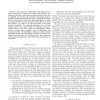Free Online Productivity Tools
i2Speak
i2Symbol
i2OCR
iTex2Img
iWeb2Print
iWeb2Shot
i2Type
iPdf2Split
iPdf2Merge
i2Bopomofo
i2Arabic
i2Style
i2Image
i2PDF
iLatex2Rtf
Sci2ools
INFOCOM
2007
IEEE
2007
IEEE
Measurement-Based Self Organization of Interfering 802.11 Wireless Access Networks
— The popularity of IEEE 802.11 WLANs has led to dense deployments in urban areas. High density leads to suboptimal performance unless the interfering networks learn how to optimally use and share the spectrum. This paper proposes two fully distributed algorithms that allow (i) multiple interfering 802.11 Access Points to select their operating frequency in order to minimize interference, and (ii) users to choose the Access Point they attach to, in order to get their fair share of the whole network bandwidth. The proposed algorithms rely on Gibbs sampler, and do not require explicit coordination among the wireless devices. They only require the participating wireless nodes to measure local quantities such as interference and transmission delay. The algorithms are shown to lead to optimal bandwidth sharing, where optimality is defined according to the minimal potential delay. We analytically prove the convergence of the proposed algorithms, and study their performance by simulation.
| Added | 03 Jun 2010 |
| Updated | 03 Jun 2010 |
| Type | Conference |
| Year | 2007 |
| Where | INFOCOM |
| Authors | Bruno Kauffmann, François Baccelli, Augustin Chaintreau, Vivek Mhatre, Konstantina Papagiannaki, Christophe Diot |
Comments (0)

